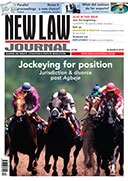THIS ISSUE

R (on the application of JS (Sri Lanka)) v Secretary of State for the Home Department [2010] UKSC 15, [2010] All ER (D) 151 (Mar)
Buyuk Camlica Shipping Trading and Industry Co Inc v Progress Bulk Carriers Ltd [2010] EWHC 442 (Comm), [2010] All ER (D) 176 (Mar)
Snippets from The Reduced Law Dictionary by Roderick Ramage
Recession prompts boost in enforced retirements
A 10-year legal battle has ended with the High Court quashing the Home Office decision to extradite businessman Mohammed Lodhi
Negative perceptions affect women’s careers
MOVERS & SHAKERS

Carey Olsen—Kim Paiva
Group partner joins Guernsey banking and finance practice
.tmb-mov69x69.jpg?sfvrsn=16d9dd3d_1)
Morgan Lewis—Kat Gibson
London labour and employment team announces partner hire

Foot Anstey McKees—Chris Milligan & Michael Kelly
Double partner appointment marks Belfast expansion
NEWS
The Ministry of Justice (MoJ) has not done enough to protect the future sustainability of the legal aid market, MPs have warned
Writing in NLJ this week, NLJ columnist Dominic Regan surveys a landscape marked by leapfrog appeals, costs skirmishes and notable retirements. With an appeal in Mazur due to be heard next month, Regan notes that uncertainties remain over who will intervene, and hopes for the involvement of the Lady Chief Justice and the Master of the Rolls in deciding the all-important outcome
After the Southport murders and the misinformation that followed, contempt of court law has come under intense scrutiny. In this week's NLJ, Lawrence McNamara and Lauren Schaefer of the Law Commission unpack proposals aimed at restoring clarity without sacrificing fair trial rights
The latest Home Office figures confirm that stop and search remains both controversial and diminished. Writing in NLJ this week, Neil Parpworth of De Montfort University analyses data showing historically low use of s 1 PACE powers, with drugs searches dominating what remains
Boris Johnson’s 2019 attempt to shut down Parliament remains a constitutional cautionary tale. The move, framed as a routine exercise of the royal prerogative, was in truth an extraordinary effort to sideline Parliament at the height of the Brexit crisis. Writing in NLJ this week, Professor Graham Zellick KC dissects how prorogation was wrongly assumed to be beyond judicial scrutiny, only for the Supreme Court to intervene unanimously







